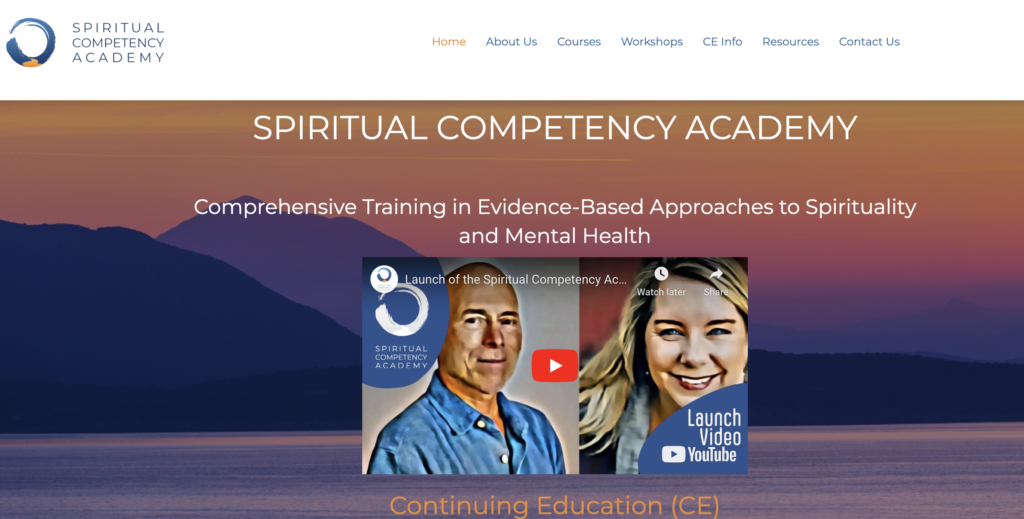Bridges Institute Continuing Education
Bridges Institute offers online continuing education courses and books to help mental health professionals enhance their knowledge and skills about religious and spiritual aspects of diversity and psychological treatment. We also provide information about high-quality continuing education courses offered by other organizations.
A Spiritually Inclusive Strategy for Psychotherapy
(9 CE Credits)
Course Creator: P. Scott Richards, PhD
This online course and accompanying book will prepare licensed mental health professionals to earn nine continuing education (CE) credits by taking an exam offered by the American Psychological Association. The online course provides content summaries, videos, current updates, and self-check exam questions about many of the topics covered in the book. More information about the book and exam is available from APA’s website (https://www.apa.org/education-career/ce/1360164).
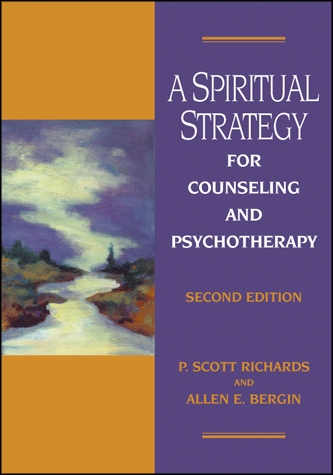
Spirituality is a fundamental and universal dimension of human life, acknowledged by major world religions, philosophers, theologians, and social scientists. The diverse landscape of spiritual expression raises critical questions regarding how psychotherapists can learn to engage with and respect their clients' varied religious and spiritual beliefs. How can therapists tap into the shared elements of human spirituality to facilitate meaningful healing and growth for their clients? While complex and challenging, these tasks are attainable goals. This course will help guide therapists in this vital endeavor.
You will gain a deeper understanding of:
(a) the historical, theological, philosophical, theoretical, and empirical foundations of spiritually inclusive psychotherapy,
b) a conceptual framework for spiritually inclusive psychotherapy,
(c) how to conduct a religious-spiritual assessment in therapy,
(d) how to use religious and spiritual interventions in therapy,
(e) the ethical and procedural considerations associated with incorporating spirituality into treatment,
(f) how to use a spiritually inclusive approach in an effective manner with clients from various religious traditions and spiritual perspectives, and
(g) how to monitor treatment processes and outcomes during therapy.
Lessons
- INTRODUCTION
- Lesson 1: Honoring Religious Diversity and Universal Spirituality in Psychotherapy
- HISTORICAL AND CONTEMPORARY PERSPECTIVES ON RELIGION, PSYCHOLOGY, AND PSYCHOTHERAPY
- Lesson 2: The Alienation of Religion and Psychology
- Lesson 3: A Post-Materialistic Spiritual Paradigm for Psychology and Psychotherapy
- THEOLOGICAL, PHILOSOPHICAL, EMPIRICAL , AND THEORETICAL FOUNDATIONS FOR SPIRITUALLY INCLUSIVE PSYCHOTHERAPY
- Lesson 4: Theological Foundations for Spiritually Inclusive Psychotherapy
- Lesson 5: Philosophical Foundations for Spiritually Inclusive Psychotherapy
- Lesson 6: Empirical Foundations for Spiritually Inclusive Psychotherapy
- Lesson 7: Theoretical Foundations for Spiritually Inclusive Psychotherapy
- THE PRACTICE OF SPIRITUALLY INCLUSIVE PSYCHOTHERAPY
- Lesson 8: Conceptual Model for Spiritually Inclusive Psychotherapy
- Lesson 9: Process Guidelines for Spiritually Inclusive Psychotherapy
- Lesson 10: Ethical Guidelines for Spiritually Inclusive Psychotherapy
- Lesson 11: Spiritual Assessment in Spiritually Inclusive Psychotherapy
- Lesson 12: Spiritual Interventions in Spiritually Inclusive Psychotherapy
- MAINSTREAMING SPIRITUALLY INCLUSIVE PSYCHOTHERAPIES INTO HEALTHCARE
- Lesson 13: Future Directions for Spiritually Inclusive Psychotherapy
This course is under development and will be available soon.
Handbook of Psychotherapy and Religious Diversity
(10 CE Credits)
Book Editors: P. Scott Richards, PhD and Allen E. Bergin, PhD
Reading this book will prepare licensed mental health professionals to earn ten continuing education (CE) credits by taking an exam offered by the American Psychological Association. More information about the book and exam is available from APA’s website (https://www.apa.org/education-career/ce/1360369).
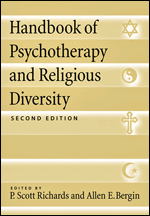
Many religious people distrust the process of psychotherapy because they fear that helping professionals will misunderstand and pathologize their spiritual beliefs.
This book provides concrete guidance for working effectively with clients from a wide range of religious backgrounds, including all of the main Christian denominations found in the United States as well as Judaism, Islam, Eastern traditions, and the ethnic-centered spirituality of African-American, Latino, and American Indian populations.
Each of the 16 core chapters is written by a contributor who is both a mental health professional and an expert in the religious tradition described. After providing key information on the history and practices of the faith, authors describe how spiritual concerns may interact with common presenting problems in clients who practice the tradition and offer guidelines for promoting trust and positive outcomes.
Rich in clinical examples, the book is an ideal training resource for both graduate students and experienced practitioners.
Table of Contents
- Contributors
- Preface
- Acknowledgments
- I. Introduction and Overview
- Toward Religious and Spiritual Competency for Mental Health Professionals
P. Scott Richards and Allen E. Bergin - Religious Diversity in North America
Roger R. Keller - II. Christianity
- Psychotherapy With Roman Catholics
Edward P. Shafranske - Psychotherapy With Members of Eastern Orthodox Churches
George Morelli - Psychotherapy With Mainline Protestants: Lutheran, Presbyterian, Episcopal/Anglican, and Methodist
Everett L. Worthington Jr., James T. D. Berry, Joshua N. Hook, Don E. Davis, Jennifer S. Ripley, and Chelsea L. Greer - Psychotherapy for Evangelical and Fundamentalist Protestants
Nancy Stiehler Thurston and Winston Seegobin - Psychotherapy With Pentecostal Protestants
Richard D. Dobbins - Psychotherapy With Latter-Day Saints
Wendy Ulrich, P. Scott Richards, Kristin L. Hansen, and Allen E. Bergin - Psychotherapy With Seventh-Day Adventists
Carole A. Rayburn - III. Judaism
- Psychotherapy With Orthodox Jews
Aaron Rabinowitz - Psychotherapy With Conservative and Reform Jews
Lisa Miller, Yakov A. Barton, Marina Mazur, and Robert J. Lovinger - IV. Islam
- Psychotherapy With Muslims
Zari Hedayat-Diba - V. Eastern Traditions
- Psychotherapy With Hindus
Anu R. Sharma and Pratyusha Tummala-Narra - Psychotherapy With Buddhists
Mark Finn and Jeffrey B. Rubin - VI. Ethnic-Centered Spirituality
- Psychotherapy With Members of African American Churches and Spiritual Traditions
Donelda A. Cook and Christine Y. Wiley - Psychotherapy With Members of Latino/Latina Churches and Spiritual Traditions
Fayth M. Parks, Maria Cecilia Zea, and Michael A. Mason - Psychotherapy With Members of Asian American Churches and Spiritual Traditions
Siang-Yang Tan and Natalie J. Dong - North American Indian and Alaska Native Spirituality and Psychotherapy
Jeff King, Joseph E. Trimble, Gayle Skawen:nio Morse, and Lisa Rey Thomas - VII. Afterword
- Religious Diversity and Psychotherapy: Conclusions, Recommendations, and Future Directions
P. Scott Richards and Allen E. Bergin - Index
- About the Editors
Continuing Education Courses Offered by Other Organizations
The Solihten Institute offers introductory and advanced courses in spiritually integrated psychotherapy for mental health and pastoral professionals.

The Spiritual Competency Training in Mental Health research supported online course is designed to train mental health providers in basic spiritual and religious competencies. Instructors: Michelle Pearce, PhD and Kenneth Pargament, PhD. Eligible for 6 CE credits.
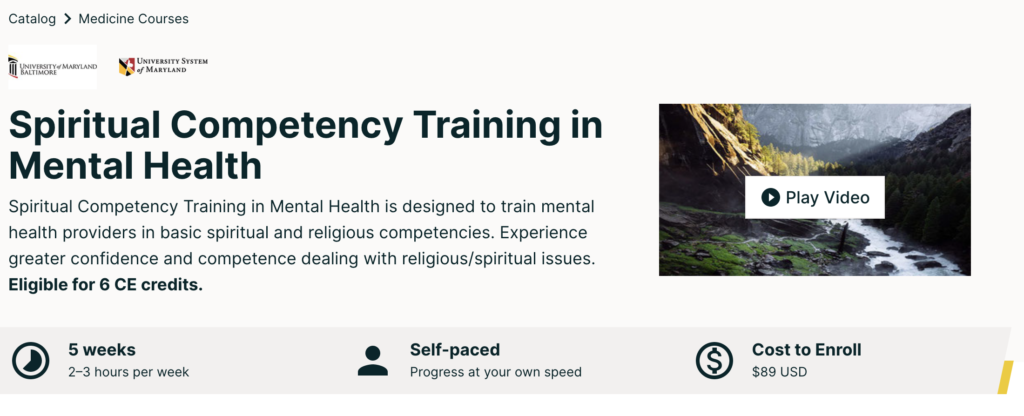
ACPE: The Standard for Spiritual Care & Integration offers an in-depth, research supported Spiritually Integrated Psychotherapy (SIP) training program for licensed and pre-licensed mental health professionals and pastoral professionals.
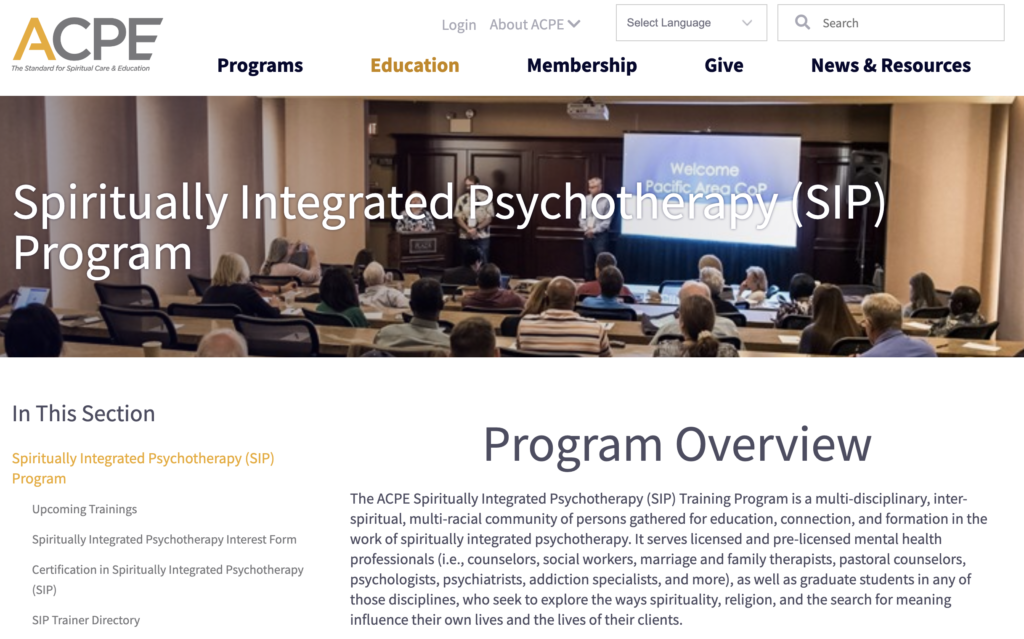
The Spiritual Competency Academy offers a variety of online CE courses on basic and advanced spiritual competencies for mental health professionals. Founders: David Lukoff, PhD and Cassandra Vieten, PhD.
